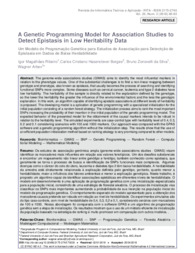A genetic programming model for association studies to detect epistasis in low heritability data.
A genetic programming model for association studies to detect epistasis in low heritability data.
Author(s): RIBEIRO, I. M.; BORGES, C. C. H.; SILVA, B. Z.; ARBEX, W. A.
Summary: Abstract The genome-wide associations studies (GWAS) aims to identify the most influential markers in relation to the phenotype values. One of the substantial challenges is to find a non-linear mapping between genotype and phenotype, also known as epistasis, that usually becomes the process of searching and identifying functional SNPs more complex. Some diseases such as cervical cancer, leukemia and type 2 diabetes have low heritability. The heritability of the sample is directly related to the explanation defined by the genotype, so the lower the heritability the greater the influence of the environmental factors and the less the genotypic explanation. In this work, an algorithm capable of identifying epistatic associations at different levels of heritability is proposed. The developing model is a aplication of genetic programming with a specialized initialization for the initial population consisting of a random forest strategy. The initialization process aims to rank the most important SNPs increasing the probability of their insertion in the initial population of the genetic programming model. The expected behavior of the presented model for the obtainment of the causal markers intends to be robust in relation to the heritability level. The simulated experiments are case-control type with heritability level of 0.4, 0.3, 0.2 and 0.1 considering scenarios with 100 and 1000 markers. Our approach was compared with the GPAS software and a genetic programming algorithm without the initialization step. The results show that the use of an efficient population initialization method based on ranking strategy is very promising compared to other models.
Publication year: 2018
Types of publication: Journal article
Unit: Embrapa Dairy Cattle
Observation
Some of Embrapa's publications are published as ePub files. To read them, use or download one of the following free software options to your computer or mobile device. Android: Google Play Books; IOS: iBooks; Windows and Linux: Calibre.
Access other publications
Access the Agricultural Research Database (BDPA) to consult Embrapa's full library collection and records.
Visit Embrapa Bookstore to purchase books and other publications sold by Embrapa.

